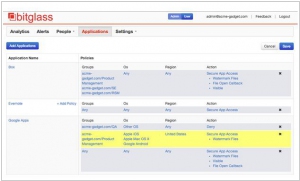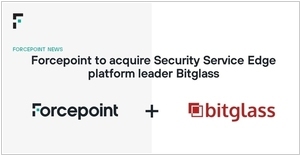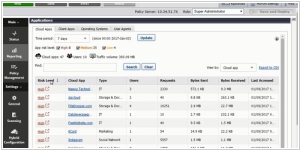Bitglass vs Forcepoint
August 06, 2023 | Author: Michael Stromann
10

Bitglass is a cloud access security broker and the leader in total data protection. We enable enterprises to migrate to SaaS applications. With cloud apps, your corporate data leaves the network. Keep cloud data secure and compliant anywhere it goes. BYOD demands a balance between security and employee productivity. Learn how MDM falls short and how Bitglass can help.
Bitglass and Forcepoint are two prominent cybersecurity solutions, each offering unique features and approaches to address different security needs. One of the key differences between Bitglass and Forcepoint lies in their focus on data protection and cloud security. Bitglass is a specialized cloud access security broker (CASB) that focuses on securing cloud applications and data. It offers features like data loss prevention (DLP), encryption, and access controls to protect data as it is accessed and shared in the cloud. Bitglass emphasizes cloud-first security, making it an ideal choice for organizations with a strong cloud presence seeking to secure their cloud-based data and applications. On the other hand, Forcepoint is known for its human-centric cybersecurity approach, aiming to protect against insider threats and data loss prevention through behavioral analytics and security policies. While Forcepoint also offers cloud security capabilities, its primary focus is on understanding and addressing risky user behavior to protect sensitive data.
Another significant distinction lies in their deployment models and integration capabilities. Bitglass is a cloud-native CASB, meaning it operates entirely in the cloud and requires no on-premises hardware or infrastructure. This cloud-based approach allows for quick deployment, automatic updates, and easy scalability. Bitglass can seamlessly integrate with various cloud applications and services, providing comprehensive protection across multiple cloud environments. In contrast, Forcepoint offers a range of cybersecurity solutions, including cloud security and data protection, with both cloud-based and on-premises deployment options. Forcepoint's integration capabilities are geared towards a broader cybersecurity ecosystem, allowing organizations to leverage the collective power of Forcepoint's diverse security offerings.
Furthermore, their global reach and customer base differ significantly. Bitglass caters to organizations of various sizes and industries, with a strong focus on securing cloud-based data and applications. Its customer base includes businesses seeking a specialized CASB solution for cloud security. On the other hand, Forcepoint has a strong presence in the government, defense, and critical infrastructure sectors, where insider threats and data protection are critical concerns. Its customer base spans across various industries, including highly regulated sectors where data loss prevention and compliance are essential considerations.
See also: Top 10 Cloud Security Software
Another significant distinction lies in their deployment models and integration capabilities. Bitglass is a cloud-native CASB, meaning it operates entirely in the cloud and requires no on-premises hardware or infrastructure. This cloud-based approach allows for quick deployment, automatic updates, and easy scalability. Bitglass can seamlessly integrate with various cloud applications and services, providing comprehensive protection across multiple cloud environments. In contrast, Forcepoint offers a range of cybersecurity solutions, including cloud security and data protection, with both cloud-based and on-premises deployment options. Forcepoint's integration capabilities are geared towards a broader cybersecurity ecosystem, allowing organizations to leverage the collective power of Forcepoint's diverse security offerings.
Furthermore, their global reach and customer base differ significantly. Bitglass caters to organizations of various sizes and industries, with a strong focus on securing cloud-based data and applications. Its customer base includes businesses seeking a specialized CASB solution for cloud security. On the other hand, Forcepoint has a strong presence in the government, defense, and critical infrastructure sectors, where insider threats and data protection are critical concerns. Its customer base spans across various industries, including highly regulated sectors where data loss prevention and compliance are essential considerations.
See also: Top 10 Cloud Security Software
Bitglass vs Forcepoint in our news:
2021. Forcepoint to acquire cloud security startup Bitglass

Forcepoint is to acquire Bitglass, a cloud security startup. This acquisition is expected to boost the efforts of the platform security vendor in making advanced data security and threat protection technologies more accessible and user-friendly for organizations. Bitglass, founded in 2013, has developed the Security Service Edge platform, which combines various technologies to secure access to and usage of sensitive data and intellectual property in web and cloud traffic, as well as private data center applications. Forcepoint acknowledged the inclusion of Cloud Access Security Broker, Secure Web Gateway, Zero Trust Network Access, Cloud Security Posture Management products, and Data Loss Prevention capabilities in this platform. Before the acquisition, Bitglass was one of the few Cloud Access Security Broker vendors that had not been acquired yet, alongside Netskope. Notably, Bitglass and Netskope had engaged in legal battles over allegations of patent infringement and theft of confidential information during the past year.



